第九章合同法
- 格式:ppt
- 大小:461.00 KB
- 文档页数:44
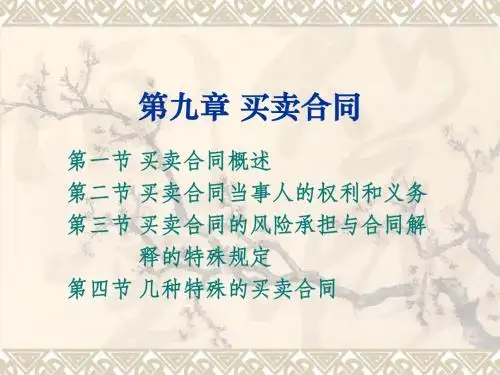
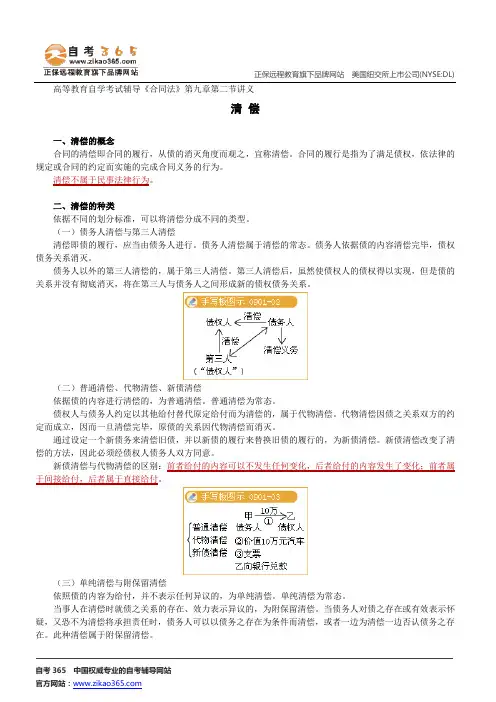
正保远程教育旗下品牌网站 美国纽交所上市公司(NYSE:DL)自考365 中国权威专业的自考辅导网站官方网站: 高等教育自学考试辅导《合同法》第九章第二节讲义清 偿一、清偿的概念合同的清偿即合同的履行,从债的消灭角度而观之,宜称清偿。
合同的履行是指为了满足债权,依法律的规定或合同的约定而实施的完成合同义务的行为。
清偿不属于民事法律行为。
二、清偿的种类依据不同的划分标准,可以将清偿分成不同的类型。
(一)债务人清偿与第三人清偿清偿即债的履行,应当由债务人进行。
债务人清偿属于清偿的常态。
债务人依据债的内容清偿完毕,债权债务关系消灭。
债务人以外的第三人清偿的,属于第三人清偿。
第三人清偿后,虽然使债权人的债权得以实现,但是债的关系并没有彻底消灭,将在第三人与债务人之间形成新的债权债务关系。
(二)普通清偿、代物清偿、新债清偿依据债的内容进行清偿的,为普通清偿。
普通清偿为常态。
债权人与债务人约定以其他给付替代原定给付而为清偿的,属于代物清偿。
代物清偿因债之关系双方的约定而成立,因而一旦清偿完毕,原债的关系因代物清偿而消灭。
通过设定一个新债务来清偿旧债,并以新债的履行来替换旧债的履行的,为新债清偿。
新债清偿改变了清偿的方法,因此必须经债权人债务人双方同意。
新债清偿与代物清偿的区别:前者给付的内容可以不发生任何变化,后者给付的内容发生了变化;前者属于间接给付,后者属于直接给付。
(三)单纯清偿与附保留清偿依照债的内容为给付,并不表示任何异议的,为单纯清偿。
单纯清偿为常态。
当事人在清偿时就债之关系的存在、效力表示异议的,为附保留清偿。
当债务人对债之存在或有效表示怀疑,又恐不为清偿将承担责任时,债务人可以以债务之存在为条件而清偿,或者一边为清偿一边否认债务之存在。
此种清偿属于附保留清偿。
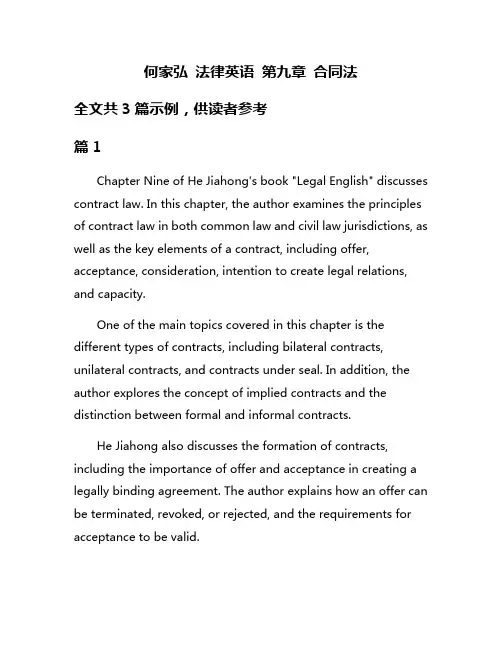
何家弘法律英语第九章合同法全文共3篇示例,供读者参考篇1Chapter Nine of He Jiahong's book "Legal English" discusses contract law. In this chapter, the author examines the principles of contract law in both common law and civil law jurisdictions, as well as the key elements of a contract, including offer, acceptance, consideration, intention to create legal relations, and capacity.One of the main topics covered in this chapter is the different types of contracts, including bilateral contracts, unilateral contracts, and contracts under seal. In addition, the author explores the concept of implied contracts and the distinction between formal and informal contracts.He Jiahong also discusses the formation of contracts, including the importance of offer and acceptance in creating a legally binding agreement. The author explains how an offer can be terminated, revoked, or rejected, and the requirements for acceptance to be valid.Another important aspect of contract law that is examined in this chapter is the doctrine of consideration. He Jiahong explains the significance of consideration in contract formation and the rules regarding adequacy of consideration and past consideration.Furthermore, the author delves into the principles of intention to create legal relations and capacity in contract law. He explains how parties must have the intention to be legally bound by the terms of a contract for it to be enforceable, and the rules regarding minors, intoxicated persons, and mentally incapacitated individuals entering into contracts.Overall, Chapter Nine of "Legal English" by He Jiahong provides a comprehensive overview of contract law principles and key concepts. By examining the various aspects of contract formation, the author offers a thorough understanding of the legal framework that governs contractual relationships in both common law and civil law systems.篇2Title: Chapter Nine of He Jiahong's "Legal English: Contract Law"Chapter Nine of He Jiahong's "Legal English: Contract Law" delves into the intricate details of contract law and provides a comprehensive overview of the key concepts and principles governing contractual relationships. This chapter examines the formation, interpretation, and enforcement of contracts, as well as the rights and obligations of the parties involved.One of the central themes of this chapter is the concept of offer and acceptance, which is essential for the formation of a valid contract. According to He Jiahong, an offer is a proposal by one party to enter into a contract on certain terms, while acceptance is the unconditional agreement to the terms of the offer. The chapter outlines the requirements for a valid offer and acceptance, including communication of the offer and acceptance, intention to create legal relations, and certainty of terms.Moreover, He Jiahong discusses the importance of consideration in contract law, which refers to the exchange of something of value between the parties. He explains that consideration is necessary to make a contract legally binding and distinguishes it from a mere promise or gift. The chapter explores different types of consideration, such as goods, services,or money, and highlights the role of consideration in preventing gratuitous promises.Furthermore, this chapter addresses the issue of contractual interpretation, emphasizing the importance of interpreting contracts objectively and in accordance with the parties' intentions. He Jiahong explains that the courts will consider the language of the contract, the surrounding circumstances, and the parties' conduct to determine the meaning of the agreement. He also discusses the various rules of contractual interpretation, such as the contra proferentem rule and the parole evidence rule.In addition, He Jiahong examines the remedies available for breach of contract, including damages, specific performance, and injunctions. He explains that damages are the most common remedy for breach of contract and can be awarded to compensate the non-breaching party for any losses suffered as a result of the breach. The chapter also explores the principles governing the assessment of damages, such as remoteness, mitigation, and causation.Overall, Chapter Nine of He Jiahong's "Legal English: Contract Law" provides a comprehensive overview of the key principles and concepts of contract law. It offers valuable insightsinto the formation, interpretation, and enforcement of contracts, as well as the rights and obligations of the parties involved. This chapter serves as an essential resource for students, practitioners, and scholars seeking to deepen their understanding of contract law in a legal English context.篇3Chapter 9 Contract LawContract law is a fundamental part of the legal system in most countries around the world. The principles of contract law govern the relationships between parties entering into agreements, and are essential for regulating commerce and promoting fairness in business dealings. In this chapter, we will examine the key concepts and principles of contract law as outlined by legal scholar He Jiahong in his book on legal English.One of the fundamental principles of contract law is the concept of offer and acceptance. An offer is a promise by one party to do something in exchange for something from the other party, and acceptance is the agreement to the terms of the offer. For a contract to be legally binding, there must be a valid offer and acceptance between the parties involved. This principle iscrucial in determining whether a contract exists and what the terms of the contract are.Another important concept in contract law is consideration. Consideration is the exchange of something of value between the parties, such as money, goods, or services. In order for a contract to be enforceable, there must be consideration from both parties. This principle ensures that both parties are giving something of value in exchange for the promises made in the contract.The principle of intention to create legal relations is also essential in contract law. This principle states that the parties must have intended for their agreement to be legally binding. In commercial agreements, this intention is usually assumed. However, in other types of agreements, such as family agreements, the intention to create legal relations may not be present, and therefore the agreement may not be legally binding.One of the key components of contract law is the concept of capacity. Capacity refers to the legal ability of a party to enter into a contract. Minors, people of unsound mind, and those under the influence of drugs or alcohol may lack capacity toenter into a contract. In these cases, the contract may be voidable by the party lacking capacity.Contracts can also be classified into different types, such as bilateral and unilateral contracts. Bilateral contracts involve a promise from each party to the other, while unilateral contracts involve a promise from one party in exchange for an act from the other party. Understanding the different types of contracts is essential for interpreting and enforcing contract law.In conclusion, contract law is a complex and important area of legal study. Understanding the key concepts and principles of contract law is essential for anyone entering into business agreements or other contractual relationships. By following the guidelines outlined in this chapter, parties can ensure that their agreements are legally binding and enforceable.。
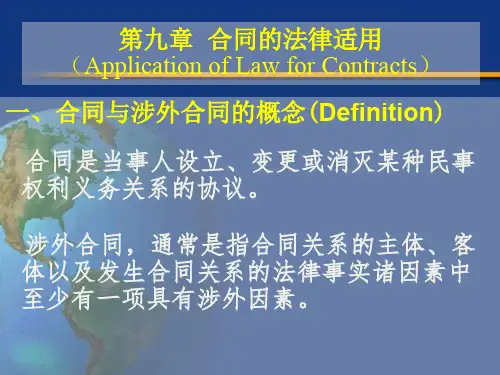

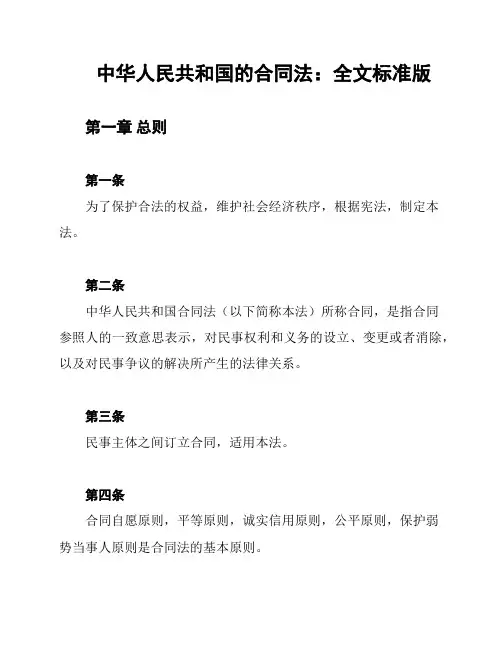
中华人民共和国的合同法:全文标准版第一章总则第一条为了保护合法的权益,维护社会经济秩序,根据宪法,制定本法。
第二条中华人民共和国合同法(以下简称本法)所称合同,是指合同参照人的一致意思表示,对民事权利和义务的设立、变更或者消除,以及对民事争议的解决所产生的法律关系。
第三条民事主体之间订立合同,适用本法。
第四条合同自愿原则,平等原则,诚实信用原则,公平原则,保护弱势当事人原则是合同法的基本原则。
第二章合同的成立第五条合同成立的要件是:合同当事人的意思表示,内容真实、明确,符合法律、行政法规的规定,不违反社会公共利益或者公共道德。
第六条合同的意思表示可以是口头的,也可以是书面的或者以其他方式表达的。
第七条合同的内容由当事人约定,但是不得违反法律、行政法规的规定,不得违背社会公共利益或者公共道德。
第八条合同的履行期限、方式由当事人约定,但是不得违反法律、行政法规的规定,也不得违背公序良俗。
第三章合同的效力第九条合同的效力自合同成立时发生。
第十条当事人对合同的效力有约定的,按照其约定;没有约定或者约定不明确的,按照本法的规定。
第十一条当事人有撤销合同的约定的,按照其约定;没有约定或者约定不明确的,依照本法的规定。
第十二条当事人违反合同约定,损害对方合法权益的,应当承担违约责任。
第十三条当事人对损害的发生及其后果有约定的,按照其约定;没有约定或者约定不明确的,按照本法的规定。
第四章合同的履行第十四条当事人应当按照合同的约定履行自己的义务,保证合同目的的实现。
第十五条当事人可以依照对方的要求,约定在合同履行的过程中增加、减少、变更合同的内容。
第十六条当事人对履行合同的方式约定不明确,或者约定不明确的,应当按照合同的性质、交易惯和当事人之间的利益等因素确定。
第十七条当事人应当按照合同的约定履行自己的义务,不得有其他损害对方合法权益的行为。
第十八条当事人在履行合同过程中发生了难以预见的情况,致使不能履行合同的,应当及时通知对方,采取措施减轻损失,并应当为对方承担损失。

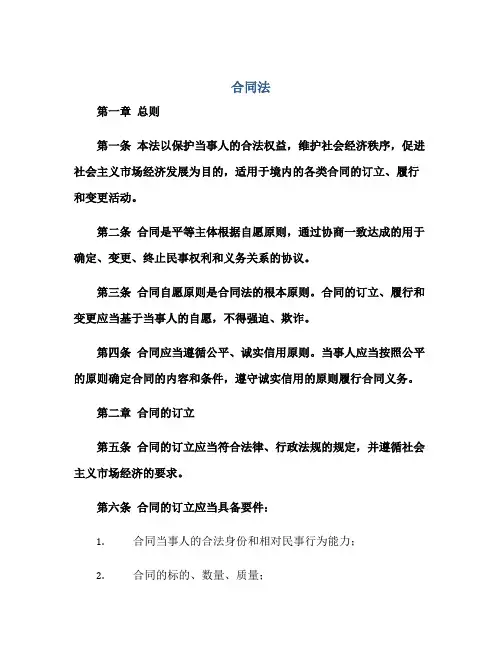
合同法第一章总则第一条本法以保护当事人的合法权益,维护社会经济秩序,促进社会主义市场经济发展为目的,适用于境内的各类合同的订立、履行和变更活动。
第二条合同是平等主体根据自愿原则,通过协商一致达成的用于确定、变更、终止民事权利和义务关系的协议。
第三条合同自愿原则是合同法的根本原则。
合同的订立、履行和变更应当基于当事人的自愿,不得强迫、欺诈。
第四条合同应当遵循公平、诚实信用原则。
当事人应当按照公平的原则确定合同的内容和条件,遵守诚实信用的原则履行合同义务。
第二章合同的订立第五条合同的订立应当符合法律、行政法规的规定,并遵循社会主义市场经济的要求。
第六条合同的订立应当具备要件:1.合同当事人的合法身份和相对民事行为能力;2.合同的标的、数量、质量;3.合同的履行期限、地点、方式;4.合同价款或者报酬。
第七条合同的形式一般可以采用书面形式、口头形式或者其他符合法律规定的形式。
第八条法律、行政法规规定应当采取书面形式的合同,应当采取书面形式。
第三章合同的效力第九条合同一经订立即发生法律效力。
合同各方应当按照合同的约定履行自己的义务。
第十条合同的效力受法律、行政法规的限制。
对于法律、行政法规规定的无效合同,不具有法律效力。
第十一条当事人有证据证明合同的内容与当事人的真实意思表示不符的,可以请求人民法院或者仲裁委员会予以效力确认或者变更。
第十二条当事人一方有下列情形之一的,合同无效:1.违反法律、行政法规的强制性规定;2.损害社会公共利益;3.恶意串通、欺诈。
第四章合同的履行和变更第十三条当事人应当按照合同的约定履行各自的义务。
合同的约定应当具备公平、合理性。
第十四条合同的履行地点和方式应当根据合同的性质、商业通行规则等因素确定。
第十五条当事人可以依法变更合同的内容和条件,但应当经过对方当事人的同意。
第十六条当事人一方出现下列情形之一的,另一方可以解除合同并要求赔偿损失:1.未履行合同义务;2.履行合同义务不符合约定的质量要求;3.履行合同义务迟延或者拒绝履行。
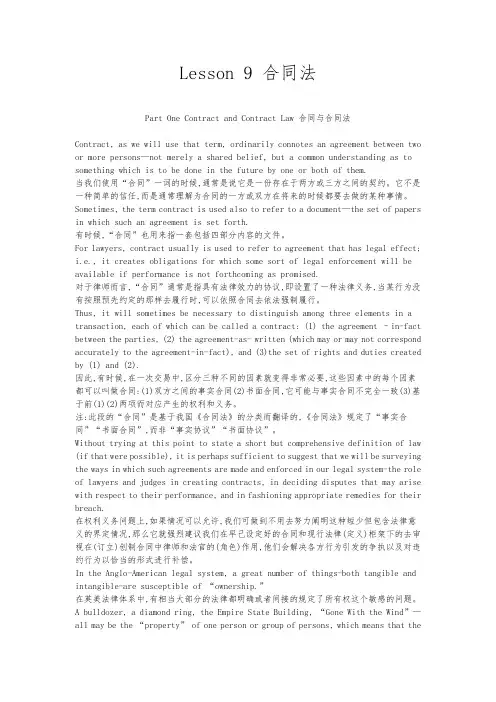
Lesson 9 合同法Part One Contract and Contract Law 合同与合同法Contract, as we will use that term, ordinarily connotes an agreement between two or more persons—not merely a shared belief, but a common understanding as to something which is to be done in the future by one or both of them.当我们使用“合同”一词的时候,通常是说它是一份存在于两方或三方之间的契约。
它不是一种简单的信任,而是通常理解为合同的一方或双方在将来的时候都要去做的某种事情。
Sometimes, the term contract is used also to refer to a document—the set of papers in which such an agreement is set forth.有时候,“合同”也用来指一套包括四部分内容的文件。
For lawyers, contract usually is used to refer to agreement that has legal effect;i.e., it creates obligations for which some sort of legal enforcement will be available if performance is not forthcoming as promised.对于律师而言,“合同”通常是指具有法律效力的协议,即设置了一种法律义务,当某行为没有按照预先约定的那样去履行时,可以依照合同去依法强制履行。
Thus, it will sometimes be necessary to distinguish among three elements in a transaction, each of which can be called a contract: (1) the agreement –in-fact between the parties, (2) the agreement-as- written (which may or may not correspond accurately to the agreement-in-fact), and (3)the set of rights and duties created by (1) and (2).因此,有时候,在一次交易中,区分三种不同的因素就变得非常必要,这些因素中的每个因素都可以叫做合同:(1)双方之间的事实合同(2)书面合同,它可能与事实合同不完全一致(3)基于前(1)(2)两项而对应产生的权利和义务。
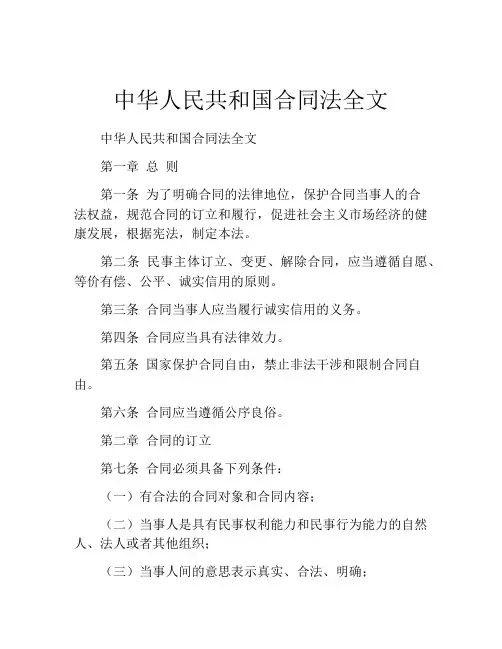
中华人民共和国合同法全文中华人民共和国合同法全文第一章总则第一条为了明确合同的法律地位,保护合同当事人的合法权益,规范合同的订立和履行,促进社会主义市场经济的健康发展,根据宪法,制定本法。
第二条民事主体订立、变更、解除合同,应当遵循自愿、等价有偿、公平、诚实信用的原则。
第三条合同当事人应当履行诚实信用的义务。
第四条合同应当具有法律效力。
第五条国家保护合同自由,禁止非法干涉和限制合同自由。
第六条合同应当遵循公序良俗。
第二章合同的订立第七条合同必须具备下列条件:(一)有合法的合同对象和合同内容;(二)当事人是具有民事权利能力和民事行为能力的自然人、法人或者其他组织;(三)当事人间的意思表示真实、合法、明确;(四)依法规定或者当事人约定的其他必要条件。
第八条当事人可以依据交易习惯、当事人之间的经营方式和交易习惯、诚信原则等约定合同条款。
第九条当事人可以采用口头、书面、电报、传真、数据电文、电子邮件等形式订立合同;使用文字形式订立合同的,应当采用中文书写。
第十条当事人利用因网络技术发展而产生的新形式订立合同的,应当遵守法律法规,履行诚信原则,并按照网络交易的特点和国家有关规定的要求确定合同的内容、格式等。
第三章合同的效力第十一条合同自成立时生效。
第十二条在合同有效期内,当事人不得变更或者解除合同;有特殊情况需要变更或者解除的,应当遵守法律法规、合同约定和诚信原则,通知对方并经过协商;变更或者解除应当采取书面形式。
第十三条合同效力受限制的情况,依照法律规定处理。
第十四条合同不能对第三人产生法律效力,但是法律另有规定的除外。
第十五条合同双方主张合同作为证据时,人民法院应当予以支持,但是合同条款不得违反法律法规的规定或者社会公共利益。
第四章合同的履行第十六条当事人应当按照合同约定的内容、方式、期限、数量等履行义务。
第十七条债务人未按照合同约定的期限履行债务的,应当承担违约责任。
第十八条当事人可以采取与合同约定的方式不同的方式履行合同,但是不得损害债权人的权益。
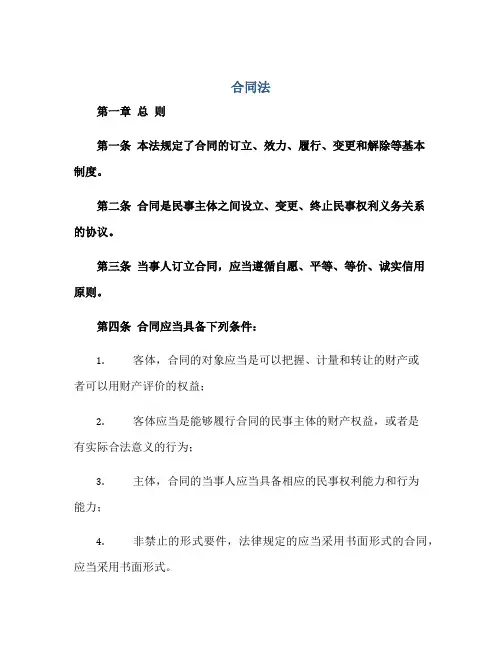
合同法第一章总则第一条本法规定了合同的订立、效力、履行、变更和解除等基本制度。
第二条合同是民事主体之间设立、变更、终止民事权利义务关系的协议。
第三条当事人订立合同,应当遵循自愿、平等、等价、诚实信用原则。
第四条合同应当具备下列条件:1.客体,合同的对象应当是可以把握、计量和转让的财产或者可以用财产评价的权益;2.客体应当是能够履行合同的民事主体的财产权益,或者是有实际合法意义的行为;3.主体,合同的当事人应当具备相应的民事权利能力和行为能力;4.非禁止的形式要件,法律规定的应当采用书面形式的合同,应当采用书面形式。
第五条合同的订立,当事人应当互相有表达意思的真实意思,并达成协议。
第六条民事行为能力人的意思表示有效,未成年人通过代理人订立的合同,需得到法定代理人的同意。
第七条无民事行为能力人、限制民事行为能力人的意思表示无效,但是法律另有规定的除外。
第八条当事人因虚假意思表示或者重大误解而订立的合同,无效。
第九条当事人应当订立书面合同,但是法律规定不得采用书面形式或者当事人约定不采用书面形式的除外。
第十条书面合同应当包括下列条款:1.当事人的姓名或者名称、住所或者居住地;2.合同标的的名称、数量、质量、性能、价款或者报酬、履行期限、履行地点和方式;3.有关履行规定、违约责任和争议解决方式等内容。
第十一条合同订立时生效,但是法律上另有规定或者当事人约定的除外。
第十二条合同生效后,当事人应当按照合同约定履行自己的义务。
第十三条合同的法律效力可以依法确定。
第十四条当事人不能履行合同的,应当承担相应的违约责任。
第十五条当事人因不可抗力不能履行合同的,不承担违约责任。
第四章合同履行和变更第十六条当事人应当按照合同约定履行自己的义务。
第十七条当事人将合同的权利义务全部或者部分转让给他人的,应当经过债权人同意或者按照法律规定的程序。
第十八条合同的履行期限可以约定,也可以不约定。
第十九条合同的履行地点可以约定,也可以不约定。
第九章合同法律制度(总则)一.单项选择题1.下列协议中,不适用《中华人民共和国合同法》的是()。
A.监护协议B.房屋租赁协议C.专利转让协议D.股权转让协议2.甲公司于3月5日向乙企业发出签订合同的要约信函.3月8日乙企业收到甲公司声明该要约作废的传真.3月10日乙公司收到该要约的信函.根据《合同法》的规定,甲公司发出传真声明要约作废的行为属于()。
A.要约撤回B.要约撤销C.要约生效D.要约失效3.甲商场向乙企业发出采购100台电冰箱的要约,乙企业于5月1日寄出承诺信件,5月8日信件寄至甲商场,时逢其总经理外出,5月9日总经理知悉了该信内容,遂于5月10日电话告知乙收到承诺。
根据合同法律制度的规定,该承诺的生效时间是()。
A.5月1日B.5月8日C.5月9日D.5月10日4.陈某以信件发出要约,信件未载明承诺开始日期,仅规定承诺期限为10天。
5月8日,陈某将信件投入邮箱;邮局将信件加盖5月9日邮戳发出;5月11日,信件送达受要约人李某的办公室;李某因外出,直至5月15日才知悉信件内容。
根据《合同法》的规定,该承诺期限的起算日为()。
A.5月8日B.5月9日C.5月11日D.5月15日5.甲公司在与乙公司协商购买某种零件时提出,由于该零件的工艺要求高,只有乙公司先行制造出符合要求的样品后,才能考虑批量购买。
乙公司完成样品后,甲公司因经营战略发生重大调整,遂通知乙公司:本公司已不需此种零件,终止谈判。
根据《合同法》的规定,下列选项中,正确的是( )。
A.甲公司构成违约,应当赔偿乙公司的损失B.甲公司的行为构成缔约过失,应当赔偿乙公司的损失C.甲公司的行为构成缔约过失,但无需赔偿乙公司的损失D.甲公司不应赔偿乙公司的任何损失6.甲公司于6月5日以传真方式向乙公司求购一台机床,要求“立即回复”。
乙公司当日回复“收到传真”。
6月10日,甲公司电话催问,乙公司表示同意按甲公司报价出售,并要求甲公司于6月15日来人签订合同书.6月15日,甲公司前往签约,乙公司要求加价,未获同意,乙公司遂拒绝签约。
2023年中华人民共和国合同法全文3篇全文共3篇示例,供读者参考篇1《2023年中华人民共和国合同法全文》第一章总则第一条为了规范合同行为,保护当事人的合法权益,促进社会主义市场经济的发展,根据宪法,制定本法。
第二条本法适用于实体及形式合同,包括国内合同和涉外合同。
第三条当事人订立、履行合同,应当遵循平等自愿、公平诚信、公共利益原则。
第四条当事人依法享有订立、修改或者终止合同的权利和自由,不得违法干涉、阻碍。
第五条本法所称合同,是当事人约定的民事权利义务关系。
第二章合同的订立第六条订立合同,应当有明确的标的、内容及条款。
第七条当事人应当对合同标的和内容作真实、完整的陈述,不得隐瞒有关事实。
第八条当事人可以约定合同的形式,但是法律另有规定的除外。
第九条当事人可以约定合同的附条件,但是所约定的附条件应当是明确的、能够成就的。
第十条订立合同,当事人应当按照法定程序办理。
第三章合同条款的解释和变更第十一条合同的条款应当根据当事人的真实意思予以解释。
第十二条合同的条款不明确、不完整或者含有重大瑕疵的,应当依照诚实信用原则予以解释。
第十三条当事人约定的有关合同的基本事项之外的具体内容,适用有关法律的规定。
第十四条当事人可以根据合同的性质、交易习惯、当事人之间事先行为或者有关法律规定的,变更合同内容。
第四章合同的履行第十五条当事人应当按照约定的时间、条件履行合同。
第十六条履行合同应当遵守合同约定,保持真实、完整。
第十七条当事人履行合同,应当必须遵守国家的法律法规。
第十八条当事人可以根据合同的内容约定支付违约金,但是应当合理。
第十九条当事人的履行方式、程度应当符合合同约定。
第二十条当事人应当按照合同的约定提供责任担保,保证合同能够按照约定履行。
第五章合同的变更和转让第二十一条当事人可以根据合同的条款约定,变更合同内容。
第二十二条当事人可以在合同生效前约定合同的转让;但是不得违背公共利益。
第二十三条当事人可以在合同生效后约定合同的转让,但是需要经过对方当事人同意。